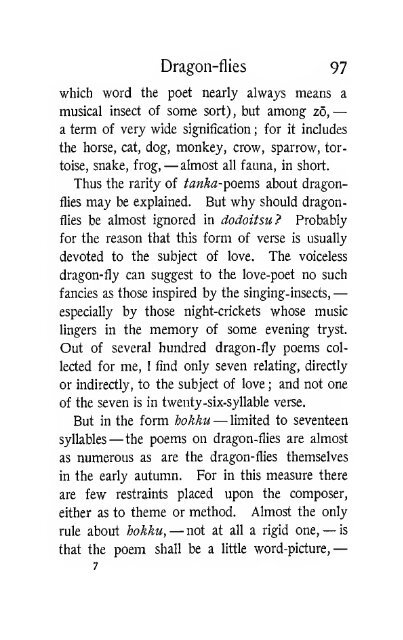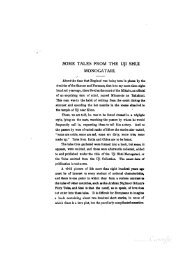- Page 2 and 3:
CORNELL UNIVERSITY LIBRARY BOUGHT W
- Page 4:
Cornell University Library The orig
- Page 9 and 10:
A JAPANESE MISCELLANY By LAFCADIO H
- Page 11:
TO MRS. ELIZABETH BISLAND WETMORE
- Page 15:
Illustrations " Oyama no, 0-Kon San
- Page 19:
Of a Promise Kept
- Page 22 and 23:
6 Japanese Miscellany and we could
- Page 24 and 25:
8 Japanese Miscellany agined that h
- Page 26 and 27:
10 Japanese Miscellany Tsunehisa, w
- Page 29:
Of a Promise Broken
- Page 32 and 33:
16 Japanese Miscellany further end?
- Page 34 and 35:
l8 Japanese Miscellany By many such
- Page 36 and 37:
20 Japanese Miscellany So speaking,
- Page 38 and 39:
22 Japanese Miscellany declaration.
- Page 40 and 41:
24 Japanese Miscellany But again at
- Page 42 and 43:
26 Japanese Miscellany ["That is a
- Page 45 and 46:
Before the Supreme Court THE great
- Page 47 and 48:
Before the Supreme Court 31 second,
- Page 49 and 50:
Before the Supreme Court 33 other K
- Page 51:
The Story of Kwashin Koji
- Page 54 and 55:
^8 Japanese Miscellany discourse to
- Page 56 and 57:
40 Japanese Miscellany possess it,
- Page 58 and 59:
42 Japanese Miscellany Several days
- Page 60 and 61:
44 Japanese Miscellany At these wor
- Page 62 and 63:
46 Japanese Miscellany There is not
- Page 64 and 65:
48 Japanese Miscellany ard was Kwas
- Page 66 and 67:
5^0 Japanese Miscellany Koji then w
- Page 69:
The Story of Umetsu Chubei
- Page 72 and 73:
5^6 Japanese Miscellany ing to the
- Page 74 and 75: S8 Japanese Miscellany dred! . . .
- Page 76 and 77: 60 Japanese Miscellany it the power
- Page 79: The Story of Kogi the Priest
- Page 82 and 83: 66 Japanese Miscellany pictures of
- Page 84 and 85: 68 Japanese Miscellany At the same
- Page 86 and 87: 70 Japanese Miscellany judge the tr
- Page 88 and 89: 72 Japanese Miscellany " Thereafter
- Page 90 and 91: 74 Japanese Miscellany such a big f
- Page 93: Folklore Gleanings
- Page 97 and 98: ONE Dragon-flies 1 of the old names
- Page 99 and 100: Dragon-flies 83 the limb, like the
- Page 101: Plate 1 I. SHro-TOMBo ("So/r' D.) 1
- Page 105 and 106: Dragon-flies 8^ IV. — Ao-tombo. A
- Page 107: Plate 3 YuREi-TOMBO (" Ghost" D.y o
- Page 111 and 112: Dragon-flies 87 the name of the Kin
- Page 113: Plate 5 Haguro-Tomb5
- Page 117 and 118: Dragon-flies 89 insect especially r
- Page 119 and 120: Dragon-flies 91 dragon-flies are sa
- Page 121 and 122: Dragon-flies 93 Aki no hi no Someta
- Page 123: Dragon-flies 95 " Even a creeping i
- Page 127 and 128: Dragon-flies 99 Tombo no Kaide yuki
- Page 129 and 130: ! ! ! Dragon-flies 101 Naki-hito no
- Page 131 and 132: Dragon-flies 105 Tombo no Ha-ura ni
- Page 133 and 134: Dragon-flies lo^ Tombo no Kabe wo k
- Page 135 and 136: Dragon-flies 107 and compared them
- Page 137 and 138: ! ! ! ! Dragon-flies 109 Go-roku sh
- Page 139 and 140: Dragon-flies 111 Even as the shadow
- Page 141 and 142: Dragon-flies 113 O dragon-fly, you
- Page 143 and 144: stake ! Dragon-flies 11^ Tombo ya H
- Page 145 and 146: Dragon-flies 117 It begins with the
- Page 147 and 148: Dragon-flies 119 the dead. A very s
- Page 149: Dragon-flies 121 moment that he sei
- Page 153 and 154: Buddhist Names of Plants and Animal
- Page 155 and 156: Buddhist Names 127 chihu, or " Bamb
- Page 157 and 158: Buddhist Names 129 nomenclature. Ko
- Page 159 and 160: Buddhist Names 131 received the gro
- Page 161 and 162: Buddhist Names 1)3 Many Buddhist na
- Page 163 and 164: Buddhist Names 13? insect called th
- Page 165 and 166: Buddhist Names 137 the River of Sou
- Page 167: Buddhist Names 139 Nembutsu, in som
- Page 171 and 172: Songs of Japanese Children UNDER th
- Page 173 and 174: Songs of Japanese Children 14^ V.
- Page 175 and 176:
Songs of Japanese Children 147 Teng
- Page 177 and 178:
Songs of Japanese Children 149 ( Mo
- Page 179 and 180:
Songs of Japanese Children 1^1 II S
- Page 181 and 182:
! ! Songs of Japanese Children 1??
- Page 183 and 184:
Songs of Japanese Children 1^5 {spa
- Page 185 and 186:
Songs of Japanese Children 1^7 Koch
- Page 187 and 188:
you I Songs of Japanese Children 1^
- Page 189 and 190:
Songs of Japanese Children l6l Oya
- Page 191 and 192:
Songs of Japanese Children 163 serv
- Page 193 and 194:
Songs of Japanese Children 16^ Clin
- Page 195 and 196:
Songs of Japanese Children 167 The
- Page 197 and 198:
Songs of Japanese Children 169 Yuki
- Page 199 and 200:
Songs of Japanese Children 171 give
- Page 201 and 202:
Songs of Japanese Children 173 Gich
- Page 203 and 204:
Songs of Japanese Children 17^ the
- Page 205 and 206:
Songs of Japanese Children 177 Yare
- Page 207 and 208:
" Songs of Japanese Children 179 O-
- Page 209 and 210:
Songs of Japanese Children l8l " Th
- Page 211 and 212:
Songs of Japanese Children 183 Nani
- Page 213 and 214:
Songs of Japanese Children 18^ Mae
- Page 215 and 216:
What ! Songs of Japanese Children 1
- Page 217 and 218:
Songs of Japanese Children 189 —
- Page 219 and 220:
Songs of Japanese Children 191 Japa
- Page 221 and 222:
Songs of Japanese Children \9} colo
- Page 223 and 224:
Songs of Japanese Children 195 gloo
- Page 225 and 226:
Songs of Japanese Children 197 chik
- Page 227 and 228:
; ! ; ; Songs of Japanese Children
- Page 229 and 230:
Songs of Japanese Children 201 whic
- Page 231 and 232:
Songs of Japanese Children 203 Ham
- Page 233 and 234:
Songs of Japanese Children 20? on t
- Page 235 and 236:
Songs of Japanese Children 207 ( To
- Page 237 and 238:
Songs of Japanese Children 209 latt
- Page 239 and 240:
Songs of Japanese Children 2H at th
- Page 241 and 242:
Songs of Japanese Children 21? San-
- Page 243 and 244:
Songs of Japanese Children 2\$ Sato
- Page 245 and 246:
Songs of Japanese Children 217 The
- Page 247 and 248:
Oh I how Songs of Japanese Children
- Page 249 and 250:
Songs of Japanese Children 221 Slee
- Page 251 and 252:
Songs of Japanese Children 223 Dard
- Page 253 and 254:
Songs of Japanese Children 225 feed
- Page 255 and 256:
Songs of Japanese Children 227 Botc
- Page 257 and 258:
Songs of Japanese Children 229 " Th
- Page 259:
Studies Here and There
- Page 263 and 264:
On a Bridge old kurumaya, Heishichi
- Page 265 and 266:
On a Bridge 237 railing: men wearin
- Page 267 and 268:
On a Bridge 239 three samurai did n
- Page 269:
The Case of 0-Dai " Honor thy fathe
- Page 272 and 273:
244 Japanese Miscellany The tablets
- Page 274 and 275:
246 Japanese Miscellany ing kindnes
- Page 276 and 277:
248 Japanese Miscellany subject to
- Page 278 and 279:
25'0 Japanese Miscellany she certai
- Page 280 and 281:
25'2 Japanese Miscellany O-Dai was
- Page 283 and 284:
THE Beside the Sea I Buddhist pries
- Page 285:
o O O (-
- Page 288 and 289:
2^8 Japanese Miscellany down awhile
- Page 290 and 291:
260 Japanese Miscellany This brief
- Page 292 and 293:
! 262 Japanese Miscellany the tip o
- Page 294 and 295:
264 Japanese Miscellany trusted. By
- Page 296 and 297:
266 Japanese Miscellany solemnity o
- Page 299 and 300:
A TYPHOON Drifting $ was coming; an
- Page 301 and 302:
Drifting 271 Kishu offing, we were
- Page 303 and 304:
Drifting 21} wind became worse, and
- Page 305 and 306:
Drifting 27? it. When that thing ap
- Page 307 and 308:
Drifting 277 instant all my strengt
- Page 309 and 310:
Drifting 279 " When we reached Kuki
- Page 311:
Otokichi's Daruma
- Page 314 and 315:
284 Japanese Miscellany queries uni
- Page 316:
286 Japanese Miscellany flower, and
- Page 319 and 320:
Otokichi's Daruma 289 ["Once! twice
- Page 321 and 322:
Otokichi's Daruma 291 so much like
- Page 323 and 324:
Otokichi's Daruma 293 Therefore 1 c
- Page 325 and 326:
Otokichi's Daruma 295 more honest t
- Page 327:
In a Japanese Hospital
- Page 330 and 331:
300 Japanese Miscellany him that to
- Page 332 and 333:
302 Japanese Miscellany But I felt
- Page 334 and 335:
304 Japanese Miscellany planet ? Of

















